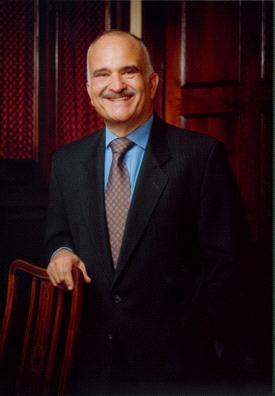By Prince El Hassan bin Talal
Like the youth of the Middle East, the City protesters see their own society as undemocratic
The human dignity deficit is more important than the budget deficit. I first came to this conclusion six years ago while working on the Commission on Legal Empowerment of the Poor with the former US Secretary of State Madeleine Albright.
That was an initiative largely created to assist developing countries, but after recent discussions with Václav Havel and the economist Joseph Stiglitz at the international conference Forum 2000, it has become clear to me that this phrase today also applies to Europe and America.
Having in part grown up in the West, as a schoolboy in Britain and as a student at Oxford, I can’t help wondering if society is changing in ways that are more than economic. It seems that the West is losing its legitimacy.
In the US what economic growth there has been in recent decades has largely gone to the top 1 per cent of the population, who today take nearly a quarter of the nation’s income. The cost of funding the Pentagon and operations in Iraq every year is almost double what the US spends on education, health, housing and transport combined.
Since the crash of 2008 the biggest banks — which are now planning huge layoffs — have grown even bigger: Bank of America, JPMorgan Chase and Wells Fargo now hold more deposits than they did before the recession.
The largest six financial institutions in the United States have assets equivalent to 60 per cent of GDP. With the exception of one or two obscure mortgage company officials, not one banker or chief executive or anyone else responsible for the economic collapse has been brought to justice.
Meanwhile, hundreds have been arrested in the Occupy Wall Street protests in New York and the movement is spreading, with riots in Rome, demonstrations in Madrid and Sydney and protesters camped outside St Paul’s Cathedral in London.
The issue is not simply one of raw economics. The protests spreading from New York are explicitly based on the recent uprisings in the Arab world. In the Middle East, patronage and a rentier system have strangled human aspiration and potential. In the West, the myopic search for profit and short-term advantage has created a corporate oligarchy whose interests are largely inimical to democracy.
The question is rapidly becoming not about Keynes or quantitative easing but whether the very machinery of Western democracy can guarantee the rights of individual men and women. For the first time the moral authority of the West, which is based on profound historical achievements, is open to question.
We can see this clearly beyond the world of economics in the continued existence of Guantánamo Bay, in settlements but no settlement in Palestine. The recent story that an Iranian-American used-car salesman was being groomed by Iran to assassinate the Saudi Ambassador to Washington was reported by many in the western media as a claim rather than as fact. Smoke and mirrors have for too long been a prelude to confrontation.
Elsewhere, in Greece and Italy, unelected officials from the European Central Bank, the International Monetary Fund and the EU are dictating government policy to an extent that the President of Germany, Christian Wulff, said “struck at the very core of democracy”.
For all the analysis and argument, history will regard what is currently being attempted in Europe as very simple: an attempt to place the burden of huge debts on those who are least able to pay and who are not responsible for creating them. New Europe is fighting for its survival in positively medieval terms.
All the while the mythology of the West, as a place of enterprise, of meritocracy and opportunity, as somewhere “that didn’t work like anywhere else” is being compromised. The consequences of this could be far more lasting than any recession could ever be. A dysfunctional West will find itself increasingly isolated and ignored. Countries hostile to the “imperial powers” will point to examples of the inequality, corruption, depression and demagoguery that they are accused of having, and will do so very much in their own interests. The world will search for new models — in India or China — for better or for worse.
To some extent this is already happening, although in countries such as Jordan we are beginning to understand that our economic and political redemption can only come from within, while keeping in mind the advice and experience of others.
Since 9/11 the Middle East has been forced to look inwards. Our young have asked themselves “Who are we?” and “What do we believe in?” They have been working very hard to answer these questions. Meanwhile, the West seems to be forgetting the convictions that made it great and of which its economies have always been a by-product.
HRH Prince El Hassan bin Talal is former Crown Prince of Jordan and is chairman and founder of the Arab Thought Forum and the West Asia North Africa Forum.
* The Times
